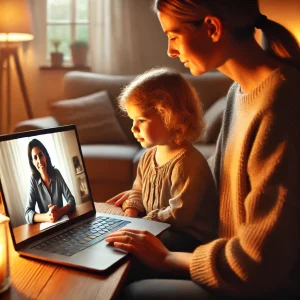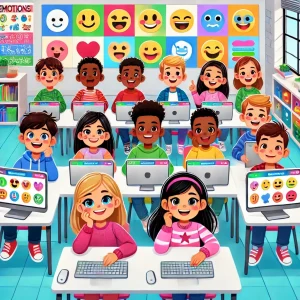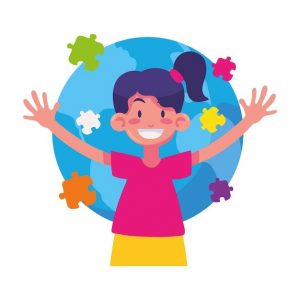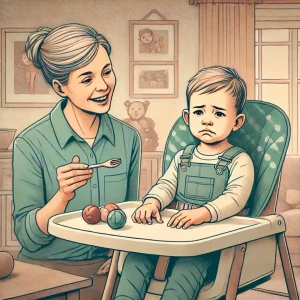Promoting Cultural Sensitivity in Online Therapy for Kids
Last Updated: September 3, 2024
In today’s increasingly diverse world, cultural sensitivity has become a crucial aspect of effective therapy, especially when working with children. When it comes to online therapy, this sensitivity becomes even more important. Cultural sensitivity in online therapy for kids ensures that children from all backgrounds feel understood, respected, and supported. By acknowledging a child’s cultural heritage, therapists can create a space where kids feel safe to express themselves, ultimately leading to better therapeutic outcomes.
Children’s cultural backgrounds profoundly shape their worldviews, behaviors, and communication styles. What might work for one child could be entirely different for another, simply because of their cultural upbringing. For example, a child’s approach to discussing emotions or handling challenges can vary widely depending on their cultural norms. Therefore, in culturally sensitive online therapy, therapists need to be aware of these differences and tailor their approaches to meet each child’s unique needs.
Also read: Child Therapy Future: Top Trends in Online Counseling
Understanding Cultural Sensitivity in Online Therapy
Cultural sensitivity in online therapy is about more than just being aware of a child’s background—it’s about fully embracing and integrating their cultural identity into the therapeutic process. In the context of online therapy, cultural sensitivity means recognizing and respecting the unique cultural influences that shape a child’s thoughts, feelings, and behaviors. This approach ensures that therapy is not just a generic process but a personalized experience that honors the child’s cultural heritage and values.
While general sensitivity or empathy in therapy involves understanding and responding to a child’s emotions, cultural sensitivity goes a step further. It acknowledges that every child comes from a distinct cultural background that affects how they view the world. For instance, certain cultural norms may influence how comfortable a child feels expressing emotions, interacting with adults, or even participating in therapy. A culturally aware therapist takes these factors into account, ensuring that the child feels understood and supported in a way that aligns with their cultural values.
In culturally aware online counseling for children, the therapist’s role is to create a safe, welcoming environment where the child’s culture is valued. This means actively listening to the child’s experiences, using culturally relevant examples and language, and being mindful of cultural traditions and practices. By doing so, therapists can build a stronger connection with the child, making therapy more effective and meaningful.
Respecting and valuing a child’s cultural background is crucial in any therapy session, but it becomes even more important in a virtual setting. In diverse online therapy for children, therapists must navigate the challenges of digital communication while maintaining a deep respect for cultural differences. This might involve adapting communication styles, being aware of cultural nuances in body language, or incorporating culturally significant symbols or practices into the therapy process.
Challenges in Promoting Cultural Sensitivity in Virtual Settings
While online therapy has opened doors to reach children across various cultural backgrounds, it also presents unique challenges in maintaining cultural sensitivity. One of the primary hurdles is the lack of physical presence. In traditional therapy, a therapist’s body language, facial expressions, and even the environment can help convey cultural sensitivity. However, in a virtual setting, these non-verbal cues are often limited, making it more difficult to establish a culturally aware connection with the child.
Another significant challenge is the reliance on digital communication. In online therapy, therapists and children communicate through screens, which can sometimes lead to misunderstandings or misinterpretations, especially when cultural differences are at play. For instance, a gesture or phrase that is common in one culture might be misunderstood or even deemed inappropriate in another. These small, yet impactful, differences can create barriers to effective communication and trust-building in therapy.
The question arises: What are the challenges of promoting cultural sensitivity in kids’ virtual therapy? One key challenge is ensuring that the therapist’s approach remains culturally relevant despite the limitations of a virtual environment. Without the full range of non-verbal communication, it becomes even more crucial to use culturally appropriate language and examples that resonate with the child’s background. Additionally, there’s the challenge of adjusting therapy materials to be more inclusive, ensuring they reflect the child’s cultural context.
To overcome these challenges, therapists can adopt several strategies. First, they can incorporate culturally relevant examples and materials into their sessions. This might include stories, visuals, or activities that reflect the child’s cultural background, helping to create a sense of familiarity and comfort. Additionally, therapists can make a conscious effort to ask open-ended questions about the child’s culture, encouraging them to share aspects of their background that are important to them. This not only builds rapport but also ensures that the therapy is more tailored and respectful of the child’s cultural identity.
Simple Steps for Cultural Sensitivity in Online Therapy
Promoting cultural sensitivity in online therapy requires thoughtful actions. Here are some simple steps to make each session more inclusive, respectful, and effective for kids.
1. Create an Inclusive Virtual Environment
Make the virtual therapy space feel as welcoming as a physical one. Consider the child’s cultural background when setting up your virtual environment. Small adjustments, like using culturally relevant backgrounds or symbols, can make the space more comfortable and inclusive.
2. Practice Active Listening and Open Communication
Listening is key in therapy, especially when it comes to cultural sensitivity. Pay close attention to both what the child says and what might be left unsaid due to cultural norms. Encourage them to express their thoughts and feelings openly, and ask questions that invite them to share their cultural views.
3. Keep Learning About Different Cultures
Cultures change over time, and so should your understanding of them. Continuously learn about the cultural backgrounds of the children you work with. This can involve reading, attending workshops, or engaging with community leaders. The more you know, the better you can understand the child’s behavior and reactions in therapy.
4. Use Culturally Relevant Tools and Materials
Incorporate tools and materials that reflect the child’s culture. This could be stories, examples, or activities that align with their background. For example, if storytelling is important in their culture, use it in your sessions to increase engagement and understanding.
5. Adapt Your Communication Style
Different cultures communicate in different ways. Some are direct, while others rely on subtle cues. Adapt your communication style to match the child’s cultural norms. For instance, in some cultures, eye contact is respectful, while in others, it might be seen as confrontational. Adjusting your approach helps build a stronger connection.
The Benefits of Culturally Sensitive Online Therapy for Kids
Culturally sensitive online therapy significantly enhances a child’s mental health and development by acknowledging and respecting their cultural background. This approach fosters a comfortable environment, crucial for effective therapy, as it builds trust and reduces anxiety, making the child more willing to engage. For instance, incorporating storytelling, a valued aspect in many cultures, can make sessions more interactive and relevant. Adjusting therapeutic methods to align with the child’s cultural communication styles enhances connectivity and effectiveness. Overall, recognizing a child’s cultural identity in therapy not only makes the virtual space feel safer and more welcoming but also encourages openness and trust, leading to better therapy outcomes.
How to Create a Culturally Sensitive Online Therapy Environment
- Reflect and Adapt
Continuously seek feedback and adapt your approach to better meet the child’s cultural needs. - Use Inclusive Language
Understand the child’s language preferences and avoid unfamiliar jargon. Simple greetings in their native language can help them feel more comfortable. - Incorporate Relevant Visuals
Use images and materials that reflect the child’s cultural background. This makes the therapy more relatable and engaging. - Mind Nonverbal Cues
Be aware of body language and tone, as these vary across cultures. Adjust your approach to respect the child’s cultural norms. - Involve Parents
Engage parents to understand their cultural practices and expectations. Their input ensures that therapy aligns with family values. - Create a Welcoming Space
Design a virtual environment that reflects the child’s culture, making them feel at home and more at ease.
Addressing Common Concerns About Cultural Sensitivity in Online Therapy
As a parent, it’s natural to wonder if your child’s cultural background will be respected in online therapy. Here’s how cultural sensitivity is important and how you can support your child’s therapy journey.
Why is cultural sensitivity important?
Cultural sensitivity makes sure that therapy respects your child’s unique background. When therapists understand your child’s culture, it helps build trust and comfort, making therapy more effective. Without this understanding, important parts of your child’s experience might be overlooked.
How does it affect online therapy?
A therapist who is culturally sensitive adjusts their approach to match your child’s cultural norms and values. This makes your child feel more connected and involved in therapy, leading to better results. For example, knowing how different cultures view mental health helps therapists use the right strategies with your child.
Simple Tips for Parents
You play a key role in your child’s therapy. Here’s how you can help:
- Share Your Child’s Background: Let the therapist know about your child’s culture, traditions, and values. This helps them provide better care.
- Stay Involved: Join therapy sessions or check in with the therapist regularly. Your involvement helps ensure your child’s culture is respected.
- Ask Questions: If you have concerns about how your child’s culture is being handled, ask the therapist. Your feedback helps improve the therapy.
- Encourage Your Child: Support your child in sharing their cultural practices or language during therapy. This strengthens their connection with the therapist.
Conclusion
Promoting cultural sensitivity in online therapy for kids is essential. When therapists take the time to understand and respect a child’s cultural background, it creates a safe and supportive environment. This helps the child feel valued and understood, making the therapy more effective. By building trust and connection through cultural sensitivity, therapists can better support the child’s mental and emotional well-being.
Parents and therapists alike should prioritize culturally sensitive practices in online therapy. Embracing and integrating cultural diversity into sessions ensures that every child’s unique identity is respected. At Wellness Hub, we focus on providing therapy that honors and values the diverse backgrounds of the children we work with. By doing so, we help create meaningful and impactful therapy experiences that truly make a difference.
Frequently Asked Questions:
1. What is cultural sensitivity in online therapy for kids?
Cultural sensitivity in online therapy for kids means understanding and respecting a child’s cultural background during therapy sessions. It involves using approaches and materials that are relevant to the child’s culture, ensuring that they feel valued, understood, and supported.
2. Why is cultural sensitivity important in children’s online therapy?
Cultural sensitivity is crucial because it helps build trust and rapport between the child and the therapist. When a child’s cultural identity is respected, they are more likely to engage openly in therapy, leading to more effective outcomes.
3. How does cultural sensitivity impact the effectiveness of online therapy?
Cultural sensitivity makes therapy more relevant and personalized for the child. By tailoring the therapy to align with the child’s cultural values and norms, therapists can address the child’s unique needs more effectively, leading to better mental health and developmental outcomes.
4. What challenges do therapists face in promoting cultural sensitivity online?
Therapists may face challenges such as limited non-verbal cues, potential misinterpretations, and the need to adapt communication styles in a virtual setting. These challenges require therapists to be extra mindful and proactive in ensuring cultural sensitivity.
5. How can therapists create a culturally sensitive online therapy environment?
Therapists can create a culturally sensitive environment by using culturally relevant language, visual aids, and nonverbal communication. Involving parents and continuously adapting therapy practices to the child’s cultural background are also key strategies.
6. How can parents support cultural sensitivity in their child’s online therapy?
Parents can support cultural sensitivity by communicating their child’s cultural background to the therapist, staying involved in the therapy process, and providing feedback. Encouraging their child to share their cultural identity during sessions also helps reinforce cultural values.
7. What are the benefits of culturally sensitive online therapy for kids?
Culturally sensitive online therapy helps children feel more comfortable and engaged in their sessions. It leads to better therapeutic outcomes by ensuring that the therapy is aligned with the child’s cultural identity, making it more effective and meaningful.
8. How does Wellness Hub prioritize cultural sensitivity in its online therapy services?
Wellness Hub focuses on providing therapy that honors and respects the diverse cultural backgrounds of the children it serves. By integrating cultural sensitivity into every session, Wellness Hub ensures that therapy is both inclusive and impactful.
9. What steps can therapists take to continuously improve cultural sensitivity in online therapy?
Therapists can improve cultural sensitivity by engaging in ongoing cultural education, seeking regular feedback from clients and their families, and reflecting on their own biases. Continuously adapting therapy approaches to better align with each child’s cultural background is key to maintaining a culturally sensitive practice.
10. How can cultural sensitivity in online therapy benefit children from diverse backgrounds?
Cultural sensitivity in online therapy ensures that children from diverse backgrounds feel understood and respected. This approach helps them feel more comfortable, encourages open communication, and ultimately leads to more effective therapy outcomes that resonate with their unique cultural identity.
About Author:
Lasya Vooturi,
Clinical Psychologist (A) & Behavioral Therapist
Lasya holds a Professional Diploma in Clinical Psychology from Amity University, where she deepened her understanding of psychological principles from March 2023 to March 2024. With over a year of dedicated experience as a Behavioral Therapist, Lasya has honed her skills in applying effective therapy techniques tailored to individual needs. Fluent in Telugu, Hindi, and English, she is adept at connecting with a diverse range of clients, ensuring comprehensive communication and understanding. Lasya’s approach is grounded in empathy and scientific rigor, making her a trusted ally in navigating mental health challenges.
Book your Free Consultation Today
Parent/Caregiver Info:
Client’s Details:
* Error Message








